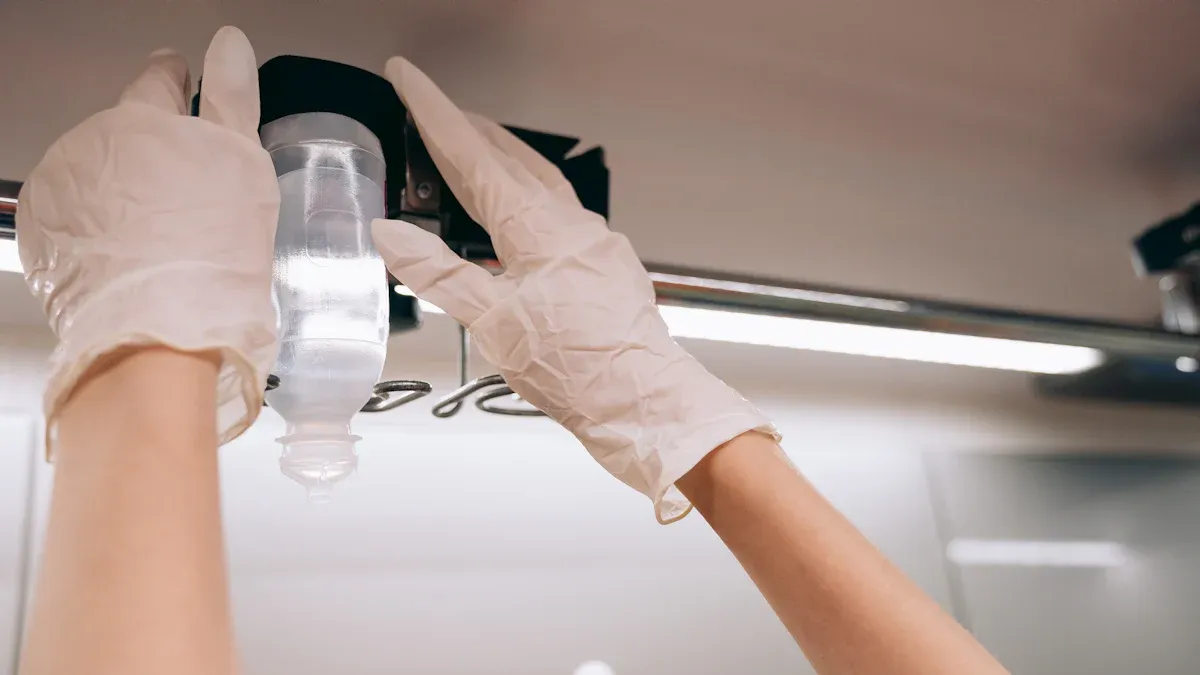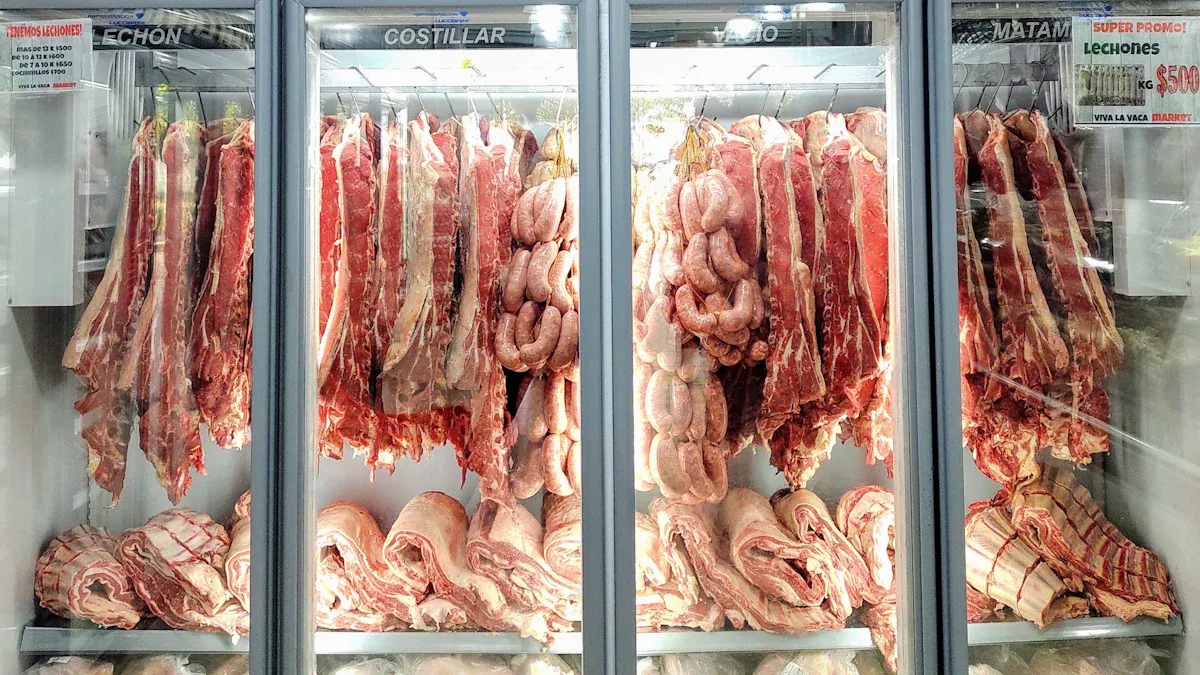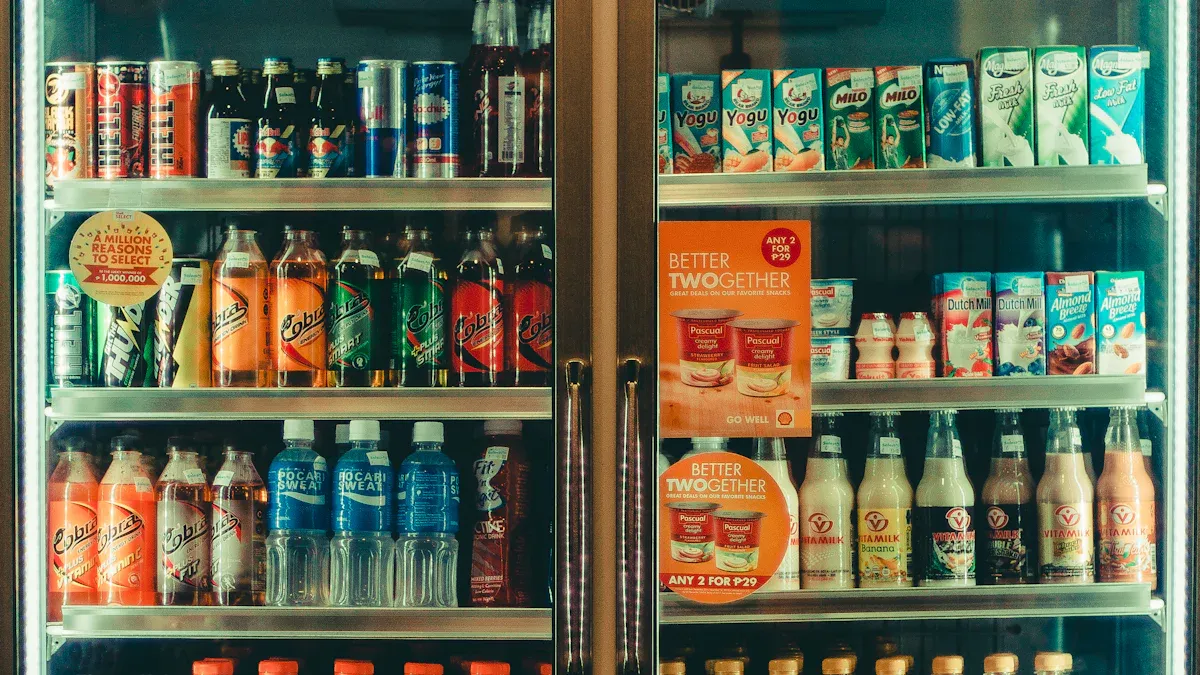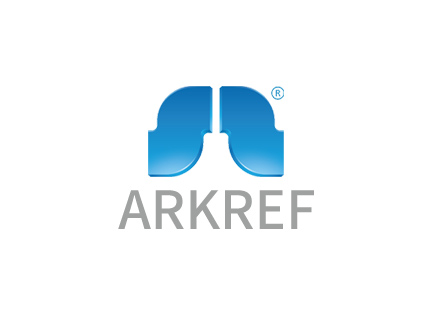Why Low Temperature Chillers Are Essential for Industrial and Medical Applications

Low temperature chillers play a key role in both industrial and medical environments. These systems deliver precise temperature control, which protects sensitive equipment and supports reliable processes. In many industrial settings, a chiller helps maintain stable temperature conditions for machines and products. Medical facilities use these chillers for cooling devices that require strict temperature limits. Modern low temperature chiller designs offer improved energy efficiency.
Higher load rates increase chiller performance.
Chilled water interconnection pipelines help reduce auxiliary power use.
Some systems save over 600,000 kWh of energy and cut thousands of kilograms of carbon emissions.
This focus on energy efficiency and hygiene, combined with the ability to reach extremely low temperatures, makes the low temperature chiller critical for quality and safety.
Key Takeaways
Low temperature chillers keep equipment and products safe by maintaining steady, precise temperatures in factories and hospitals.
These chillers improve energy efficiency, helping companies save money and reduce their environmental impact.
Chilled water systems move heat away from machines and rooms, supporting reliable and clean cooling processes.
Regular maintenance of chillers extends equipment life and ensures consistent cooling performance.
Without proper cooling from chillers, equipment can fail and products like food and medicine can spoil, causing safety risks and financial losses.
Low Temperature Chiller Basics
What Is a Low Temperature Chiller
A low temperature chiller is a machine that cools water or other fluids to very low temperatures. This cooling helps keep equipment and products at the right temperature. Many industries and hospitals use these chillers to protect sensitive devices and materials. The main job of a low temperature chiller is to remove heat from a process or space. This keeps the temperature steady, even when the workload changes.
Technical studies show that a low temperature chiller works well under different load conditions. When the load rate goes up, the chiller becomes more efficient. Researchers use models and data to check how well the chiller performs. They look at numbers like R2 and P-values to make sure the chiller does its job. These studies also show that chillers can save a lot of energy—over 600,000 kWh in some cases. They also help cut down on carbon emissions. These facts prove that a low temperature chiller gives strong, energy-saving cooling at low temperatures.
How Chilled Water Systems Work
Chilled water systems use water as a way to move heat away from equipment or rooms. The chiller cools the water, then pumps it through pipes to where cooling is needed. The water picks up heat and returns to the chiller to get cooled again. This cycle keeps the temperature under control.
In hospitals, chilled water systems cool operating rooms and equipment rooms.
In factories, these systems help cool machines and keep products safe.
Electrolyzer cooling water flow rates can range from 15 to 25 gallons per minute for a 25 kW system.
Heat exchangers in HVAC lines keep temperature differences between 40°C and 80°C for better thermal control.
Water quality is important, especially for medical uses, with strict limits on dissolved solids and chloride.
Chilled water systems play a big part in both industrial and medical cooling. They help keep temperature steady, protect equipment, and support safe, reliable operations.
Industrial Chillers in Action

Equipment Protection
Industrial chillers play a vital role in protecting equipment. Many machines in industrial settings generate a lot of heat during operation. If this heat builds up, it can damage sensitive parts. A chiller removes excess heat and keeps the temperature stable. This process prevents overheating and helps machines last longer. For example, hydraulic systems need steady cooling to avoid breakdowns. When the temperature stays within safe limits, equipment works better and needs fewer repairs.
Tip: Regular maintenance of a chiller improves its cooling capacity and extends the life of industrial equipment.
Industrial applications often require a cooling solution that can handle heavy loads. A chiller with high cooling capacity can support large machines and keep them running smoothly. This protection is important for both safety and productivity.
Process Efficiency
Industrial chillers also improve process efficiency. Many manufacturing processes need precise temperature control. If the temperature changes too much, products may not meet quality standards. A chiller keeps the temperature steady, which helps maintain product quality.
Factories use chillers to cool molds in plastic production.
Food processing plants rely on chillers to keep products fresh.
Scanning systems, like those used in quality checks, need stable cooling for accurate results.
A cost-effective cooling solution reduces energy use and saves money. Industrial chillers with good chiller performance use less power while delivering strong cooling. This approach supports energy efficiency and lowers operating costs.
Specialized Cooling Needs
Some industrial processes have unique cooling needs. For example, chemical plants may need to cool fluids to very low temperatures. A chiller designed for these tasks can reach the required temperature quickly and safely. This ability makes the chiller a key part of many industrial applications.
Note: Choosing the right cooling solution depends on the specific application and the cooling capacity needed.
Industrial chillers help companies meet strict safety and environmental rules. Many modern chillers use eco-friendly refrigerants and advanced controls. These features reduce the impact on the environment and improve efficiency. By using a chiller, industries can protect their equipment, improve process efficiency, and meet their cooling needs in a safe and reliable way.
Medical Chiller Applications

Medical Device Cooling
Hospitals and clinics rely on chillers to keep medical devices at the right temperature. MRI machines, CT scanners, and laser generators all need steady cooling. These machines create a lot of heat during use. If the temperature rises too high, the equipment can break down or give wrong results. A chiller removes extra heat and keeps the temperature stable. This helps doctors and nurses trust their machines every day.
Tip: Regular checks on the chiller help keep medical devices safe and working well.
A good cooling solution also protects sensitive electronics inside the machines. When the temperature stays steady, the devices last longer and work better. Many hospitals choose a chiller with high cooling capacity to handle the heavy workload of modern medical equipment.
Pharmaceutical Hygiene
Pharmaceutical companies must keep their products clean and safe. They use chillers to control the temperature during drug production and storage. Many companies use closed-loop cooling systems. These systems keep the cooling water separate from the outside air. This design stops germs and dirt from getting into the process.
Closed-loop systems help keep the cooling water clean.
Clean water means safer medicine for patients.
The right cooling solution supports strict hygiene rules in the industry.
A chiller with strong chiller performance helps keep the temperature just right. This protects the quality of the medicine and keeps people safe. Companies trust these systems for every step of drug production.
Imaging and Laboratory Support
Labs and imaging centers need steady cooling for their work. Machines like X-ray units, blood analyzers, and DNA sequencers all need a stable temperature. If the temperature changes too much, test results can become wrong. A chiller keeps the temperature steady so scientists and doctors can trust their findings.
Note: Good cooling also helps labs save energy and lower costs.
A reliable chiller supports many types of laboratory equipment. It helps keep samples fresh and protects sensitive tools. This application shows how important cooling is for science and medicine.
Medical Area | Equipment Supported | Why Cooling Matters |
|---|---|---|
Imaging | MRI, CT, X-ray | Prevents overheating |
Laboratory | Analyzers, sequencers | Keeps results accurate |
Pharmaceutical | Production lines | Maintains hygiene & safety |
Chillers play a key role in every part of medical care. They protect equipment, keep products safe, and support important work in labs and hospitals.
Benefits of Chilled Water Systems
Product Quality and Safety
Chilled water systems help companies keep products safe and high in quality. These systems control temperature with great accuracy. When a factory uses a chiller, it can stop products from getting too hot or too cold. This control protects food, medicine, and chemicals from damage. Many industries trust chilled water systems to keep their products fresh and safe for customers.
A steady temperature also helps prevent bacteria and mold from growing. In medical labs, chilled water systems protect samples and keep test results correct. In food factories, they help stop spoilage. Workers can trust that the products will meet safety rules.
Note: Chilled water systems support clean and safe workspaces by reducing the risk of contamination.
Energy Efficiency
Chilled water systems offer strong energy efficiency. These systems use less power than many other cooling methods. A chiller can cool large spaces or many machines at once. This setup saves energy and lowers costs for companies.
Many chilled water systems use smart controls. These controls adjust cooling based on the needs of the building or process. When the demand for cooling drops, the system uses less energy. This feature helps companies save money and protect the environment.
Benefit | Description |
|---|---|
Lower energy use | Uses less power for cooling |
Cost savings | Reduces monthly bills |
Environmental impact | Cuts carbon emissions |
The benefits of chilled water systems include better product safety and strong energy savings. Companies that use these systems help protect the planet while keeping their products safe and reliable.
Risks Without a Chiller
When a facility does not use a chiller, many problems can happen. Machines and products need the right cooling to work well. Without proper cooling, risks increase for both equipment and products.
Equipment Failure
Machines in factories and hospitals often get hot during use. If the heat does not go away, parts can break or stop working. Overheating can cause motors to burn out or wires to melt. Some devices may shut down to protect themselves, but others may fail without warning.
Note: Sudden equipment failure can stop production lines or delay medical treatments.
A chiller helps keep machines at a safe temperature. Without it, repair costs can rise. Downtime can last longer, and workers may need to replace expensive parts. In some cases, equipment may never work the same again.
Product Loss
Products also face risks when cooling is not enough. Food, medicine, and chemicals can spoil or become unsafe. If the temperature goes too high, bacteria can grow in food or medicine. Some products may lose their quality or become dangerous to use.
Food can spoil faster.
Medicine may not work as expected.
Chemicals can change or react in harmful ways.
A table below shows what can happen without a chiller:
Product Type | Risk Without Cooling | Possible Result |
|---|---|---|
Food | Spoilage, bacteria growth | Unsafe to eat |
Medicine | Loss of strength | Ineffective treatment |
Chemicals | Unwanted reactions | Safety hazards |
Callout: Companies can lose money and trust if products fail because of poor cooling.
Proper cooling protects both equipment and products. Without a chiller, the risks can lead to big losses and safety problems.
Low temperature chillers help keep equipment safe and products high in quality. They support precise temperature control in factories and hospitals. Many companies choose these systems for better energy efficiency and reliable results.
Product safety improves with steady cooling.
Equipment lasts longer with the right system.
Choosing the best cooling solution depends on each facility’s needs. Careful planning leads to safer and more efficient operations.
FAQ
What industries use low temperature chillers most often?
Many industries use low temperature chillers. Factories, hospitals, laboratories, and pharmaceutical companies rely on these systems. They help protect equipment, keep products safe, and support important processes.
How does a low temperature chiller improve product safety?
A low temperature chiller keeps products at the right temperature. This control stops bacteria from growing and prevents spoilage. Companies trust chillers to keep food, medicine, and chemicals safe for use.
Can a low temperature chiller help save energy?
Yes. Modern chillers use smart controls and efficient designs. These features lower energy use and reduce costs. Many companies see big savings on their power bills.
What maintenance does a low temperature chiller need?
Regular checks keep a chiller working well. Technicians clean filters, check fluid levels, and inspect parts. Good maintenance helps the system last longer and work better.
See Also
The Importance Of Cold Rooms In Modern Storage
Proven Strategies To Boost Walk-In Chiller Performance
Why Flake Ice Machines Remain Vital For Industry Use
How Cold Rooms Preserve Freshness In Food Products
Transforming Industrial Storage With Advanced Cold Room Solutions

